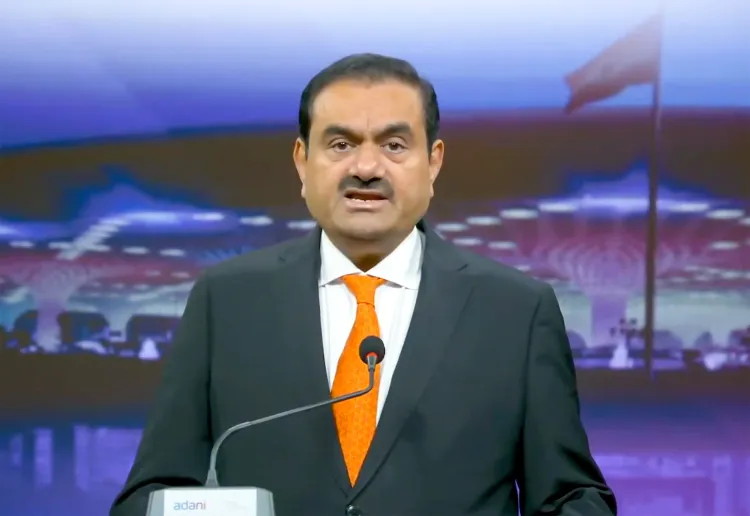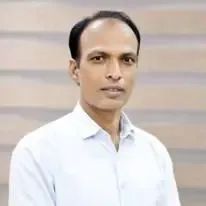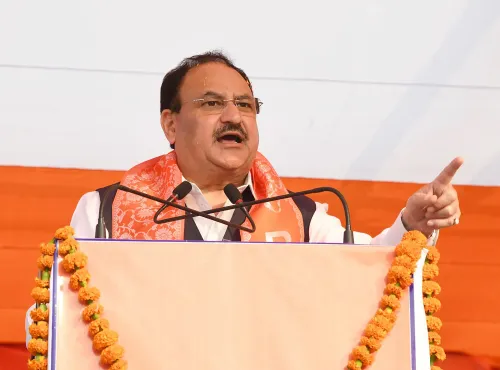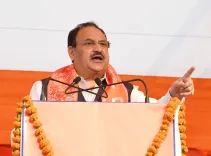Can Gautam Adani Inspire Entrepreneurs to Create India's First AI-Powered Spinal Diagnostic Platform?

Synopsis
Key Takeaways
- Lower back pain is a major national crisis affecting productivity.
- Entrepreneurs are urged to create AI-powered spinal diagnostic tools.
- Investment in healthcare is essential for national growth.
- Mobile operating theatres can transform rural healthcare.
- Quality training for future doctors is crucial.
Mumbai, July 11 (NationPress) The rising prevalence of lower back pain is a significant challenge that can hinder national productivity, remarked Gautam Adani, Chairman of the Adani Group, on Friday. He called upon innovators to create India's first AI-driven spinal diagnostic platform.
Speaking at the 5th Annual Conference of the Society for Minimally Invasive Spine Surgery-Asia Pacific (SMISS-AP) in Mumbai, Adani expressed concern over the alarming statistics surrounding lower back pain, which has emerged as a primary cause of disability in India, surpassing conditions such as diabetes and heart disease.
“I was taken aback to discover that lower back pain is now a leading cause of disability in our nation, affecting nearly 50% of adults yearly,” Gautam Adani stated. “This situation transcends health concerns; it poses a national emergency reflected in lost productivity, escalating healthcare expenses, and shattered aspirations.”
The industrialist emphasized the need for “entrepreneurial creativity” to develop affordable, AI-enhanced solutions for spinal health that can support the nation's goals. “I challenge you to pioneer India's first AI-centric spinal diagnostic platform that identifies degeneration before it leads to disability,” he urged.
“The spine you preserve today could belong to the future engineer, farmer, scientist, or entrepreneur,” he added. Adani also encouraged innovators to rethink rural surgical practices by establishing “mobile operating theatres” that can provide hope to underserved communities.
He further proposed the establishment of a spinal hospital that could serve as “a global hub for robotic surgery, regenerative medicine, and next-generation bio-integrated implants.”
Gautam Adani assured the audience of the Adani Group's commitment to advancing healthcare in India. “Three years ago, on my 60th birthday, my family pledged Rs 60,000 crore for initiatives in healthcare, education, and skills development,” he shared.
He highlighted that the Adani Group aims to create a healthcare system that evolves with scientific advancements while maintaining a focus on patient-centric care. “We are dedicated to building a comprehensive, multidisciplinary framework that integrates clinical care, education, and research,” he explained.
“Our investments will focus on adaptable infrastructure capable of rapid expansion during crises. We are advocating for renowned healthcare institutions that fuse innovation, patient care, and practical education in one facility,” Gautam Adani added.
He also stressed the importance of training future doctors in robotics, AI, systems thinking, and healthcare management, ensuring they possess empathy, ethics, and entrepreneurial skills beyond their anatomical education.
In addition, Gautam Adani announced plans to invest in elite training institutes and establish strict protocols to cultivate a culture of quality in healthcare.
“Our mission is to construct an integrated, intelligent, inclusive, and inspired healthcare system for India’s future. This will be realized through the Adani Healthcare Temples—1,000-bed integrated facilities starting from Ahemdabad and Mumbai,” he concluded.
“These facilities will be designed as world-class, affordable, and AI-first healthcare ecosystems, with guidance from the Mayo Clinic on design, implementation, and global healthcare standards,” the industrialist asserted.









